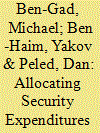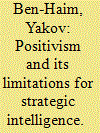|
|
|
Sort Order |
|
|
|
Items / Page
|
|
|
|
|
|
|
| Srl | Item |
| 1 |
ID:
175315


|
|
|
|
|
| Summary/Abstract |
We apply the information gap approach to resource allocation under Knightian (non-probabilistic) uncertainty in order to study how best to allocate public resources between competing defence measures. We demonstrate that when determining the level and composition of defence spending in an environment of extreme uncertainty vis-a-vis the likelihood of armed conflict and its outcomes, robust-satisficing-expected utility will usually be preferable to expected utility maximisation. Moreover, our analysis suggests that in environments with unreliable information about threats to national security and their consequences, a desire for robustness to model misspecification in the decision-making process will imply greater expenditure on certain types of defence measures at the expense of others. Our results also provide a positivist explanation of how governments seem to allocate security expenditures in practice.
|
|
|
|
|
|
|
|
|
|
|
|
|
|
|
|
| 2 |
ID:
149296


|
|
|
|
|
| Summary/Abstract |
Reducing uncertainty is a central goal of intelligence analysis. 'Reducing uncertainty' can mean (1) reduce ignorance or ambiguity or potential for surprise in describing situations or intentions, or (2) reduce adverse impacts of ignorance, ambiguity or surprise on decision outcomes. We make two claims. First, the second meaning needs greater attention in intelligence analysis. Uncertainty itself isn't pernicious, but adverse impact of surprise is. Some policy options are less vulnerable to uncertainty than others. These less vulnerable (i.e. more robust) options can tolerate more uncertainty. Analysts should identify policy options that are robust to uncertainty. Second, reducing the impact of uncertainty requires awareness of policymakers' goals. This needn't conflict with analysts' policy neutrality. Tension between neutrality and involvement arises in economics, engineering, and medicine. The method of info-gap robust-satisficing supports decision making under uncertainty in these and other disciplines. Implications for intelligence analysis are explored in this paper. We discuss the assessment of Iraqi WMD capability in 2002.
|
|
|
|
|
|
|
|
|
|
|
|
|
|
|
|
| 3 |
ID:
160711


|
|
|
|
|
| Summary/Abstract |
Knowledge underlies rational choice between options. Predictive optimization is the prioritization of options according to their predicted outcomes based on available knowledge. The epistemological justification of predictive optimization is based on positivism, which asserts that facts and laws about the world exist and are discoverable. However, knowledge of human affairs in strategic adversarial interactions is often severely limited and erroneous: residual uncertainty is often vast. This results especially from deception and innovation by the adversary which introduce deep Knightian uncertainty. Consequently, predictive optimization is unreliable: outcomes may differ substantially from predictions. An alternative strategy for prioritization of options is info-gap robust satisficing: achieve critical goals (that are adequate but perhaps suboptimal) over a wide range of deviation of reality from current knowledge. The epistemological justification of robust satisficing is based on extending positivism to acknowledge and manage the unknown. Prioritization of options by robust satisficing manages both the limitations of knowledge and the need for achieving critical goals. This critique of positivism is not constructivist. Rather, we extend positivism to account for highly deficient knowledge. We present several examples and conclude by discussing the relation between inductive, abductive and deductive inference.
|
|
|
|
|
|
|
|
|
|
|
|
|
|
|
|
| 4 |
ID:
131360


|
|
|
|
|
| Publication |
2014.
|
| Summary/Abstract |
The evaluation and selection of military strategy requires consideration of myriad factors - social, historical, political, geographical and technological - together with vast uncertainties encompassing all these domains. Info-gap decision theory is a conceptual framework that can support these deliberations and that has substantive implications for the formulation, evaluation and selection of strategic goals and of the means to attain them. In particular, while the analyst may desire to reliably achieve the best possible outcome, info-gap theory provides a critique of, and alternative to, the paradigm of optimizing the outcome of a decision. In selecting between strategy alternatives, the analyst must sometimes choose between one alternative that is purportedly better than another, but also more uncertain. Such a choice is a dilemma whose resolution requires the analyst to balance between the different predicted qualities of each alternative and their different vulnerabilities to uncertainty. The dilemma can be managed with the info-gap methodology of robustly satisfying critical requirements.
|
|
|
|
|
|
|
|
|
|
|
|
|
|
|
|
| 5 |
ID:
188267


|
|
|
|
|
| Summary/Abstract |
Strategic analysts and planners need distinct capabilities to include extensive disciplinary expertise and a broad understanding of the world and methodological expertise for dealing with innovation, discovery, and surprise. Specifically, the analyst needs to evaluate the robustness of a policy to the uncertainty of an assessment. The analyst must have both topical expertise in the disciplines underlying the analysis, as well as decision-theoretic expertise in managing uncertainty. This is demonstrated by applying info-gap decision theory and the concept of robust-satisficing to the analysis of policy in response to al-Qaeda prior to 11 September 2001, which illustrates the combination of topical and decision-theoretic expertise.
|
|
|
|
|
|
|
|
|
|
|
|
|
|
|
|
|
|
|
|
|